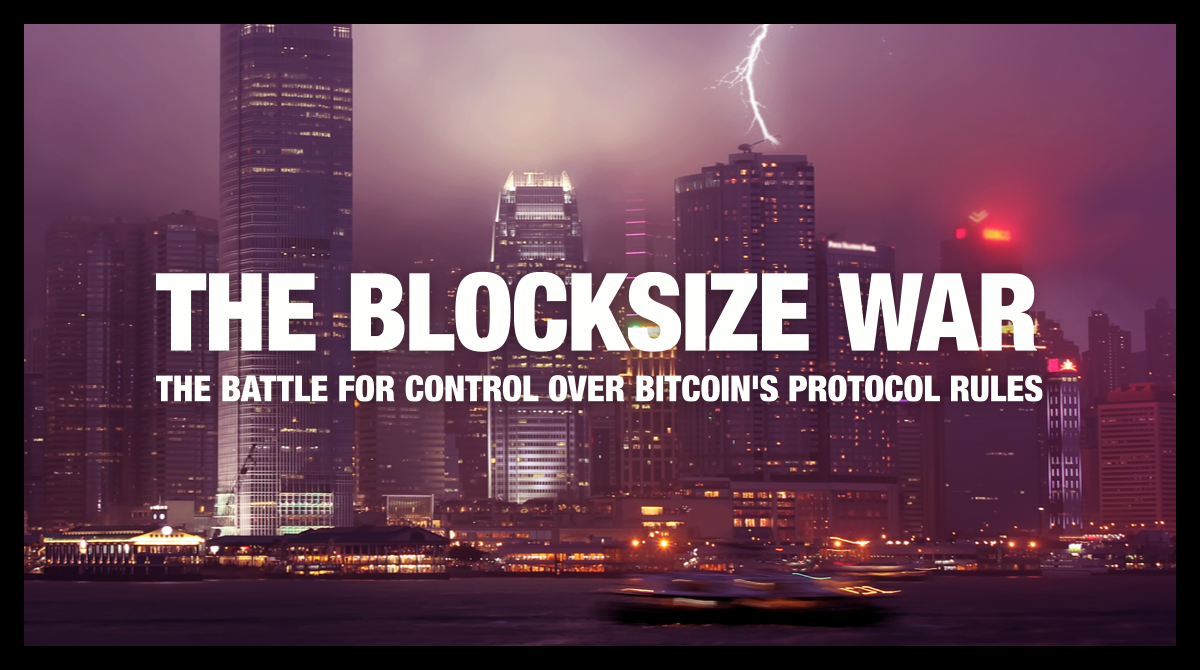Chapter 15 of the book The Blocksize War is published below. The full book is available on Amazon. As a reminder, 50% of any profits from physical book sales will be donated to Médecins Sans Frontières, a charity that provides medical assistance to people affected by conflict, epidemics, disasters, or exclusion from healthcare.*
* Note: Applies to sales up until the earlier of i. the death of the author and ii. January 2031
The Blocksize War – Chapter 15 – Dragons’ Den
On April 6, 2017, the co-author of the lightning whitepaper, Joseph Poon, mentioned a secret small blocker channel, where many of the public relations decisions are made:
They just have a secret channel where they organize their PR and trolling campaigns. Many people have talked about it (more than 5 people) and it’s alluded to in various places which are publicly accessible, since it’s basically where a lot of decisions around PR happens.
I’m extremely upset that they are attacking me for going to the press when they participate in far more underhanded tactics, and all of Core knows full well what they’re doing if not actively contributing.
I think the BU community does similar things on their slack. What I’m upset about is more that prominent members of Core are attacking me for it and assuming ill will. It’s very personal. Like they present me as some kind of sellout but I’ve probably made the least money from bitcoin compared to everyone prominent in the community. I find it incredibly insulting.
The following day, large blockers discovered a video presentation by Bram Cohen, the inventor of Bittorrent, which was given in January 2017. During the presentation, a Slack channel called “dragonsden” accidentally popped up on screen, a channel on the Bitcoin Core Slack. It was a private channel that had 21 members. On the screen, it was possible to identify a few members, who the large blockers perceived as well-known small block trolls, including some of the moderators of the Bitcoin subreddit. To the large blockers, this was a major scandal, evidence of coordination on the small block side, a link between the Bitcoin subreddit, Bitcoin Core and a propaganda campaign. The large blockers are also likely to have had secret communication and coordination channels focusing on public relations. This was the political nature of the situation: the conflict had evolved to an extent where such communication channels were necessary. To me, there was one clear takeaway from this “scandal”; I simply had to get inside the Dragons’ Den. A few weeks later, after asking around a bit, I was in! I made it into the depths of the Dragons’ Den.
The channel was very active and entirely focused on the blocksize war. Most of the conversion revolved around social media, public relations and how best to expose weaknesses in the narratives and arguments put forward by the large blockers. Many participants in the channel appeared very committed to the cause. Discussion often focused around how to convince various people to join the small block camp, who was likely to turn, and which would be the most effective issues to focus on in social media. There was also discussion on memes and meme production. This war was also a meme war, and the “Dragons”, as members of the channel were sometimes called, were very involved in meme production. Many of these memes were humorous, designed to make the large blockers appear as if they had a weak understanding of some of the technical issues in Bitcoin, with Roger Ver, Craig Wright and Jihan Wu being the main focus of attention. Another strategy was linking Roger Ver with Craig Wright, although, to be fair, Roger did not make their life too difficult here.
What really impressed me about the Den was the intensity of the discussion, at least in the early part of 2017. The channel was active 24 hours a day, seven days a week. No matter what time of day it was, something was going on in the blocksize war.
As for whether the tactics employed by the Dragons were always entirely ethical is open to question. Both sides, of course, accused the other of underhand tactics. The accusations were typically that people were being toxic, secretive, malicious, dishonest and manipulative. However, ironically, what was apparent to me was that the methods and tactics used by each side in the conflict were remarkably similar; you could even say identical. Neither side had a perfect track record with respect to integrity in this war, and it was perhaps hypocritical for either side to point the finger at the other for being particularly bad or unethical. While there were some actions inside the Den which were a bit mischievous, it was nothing too sinister. There was certainly no evidence of anything illegal occurring from either side in this conflict, except perhaps the DDoS attacks, however I saw no evidence this was planned in the Den.

